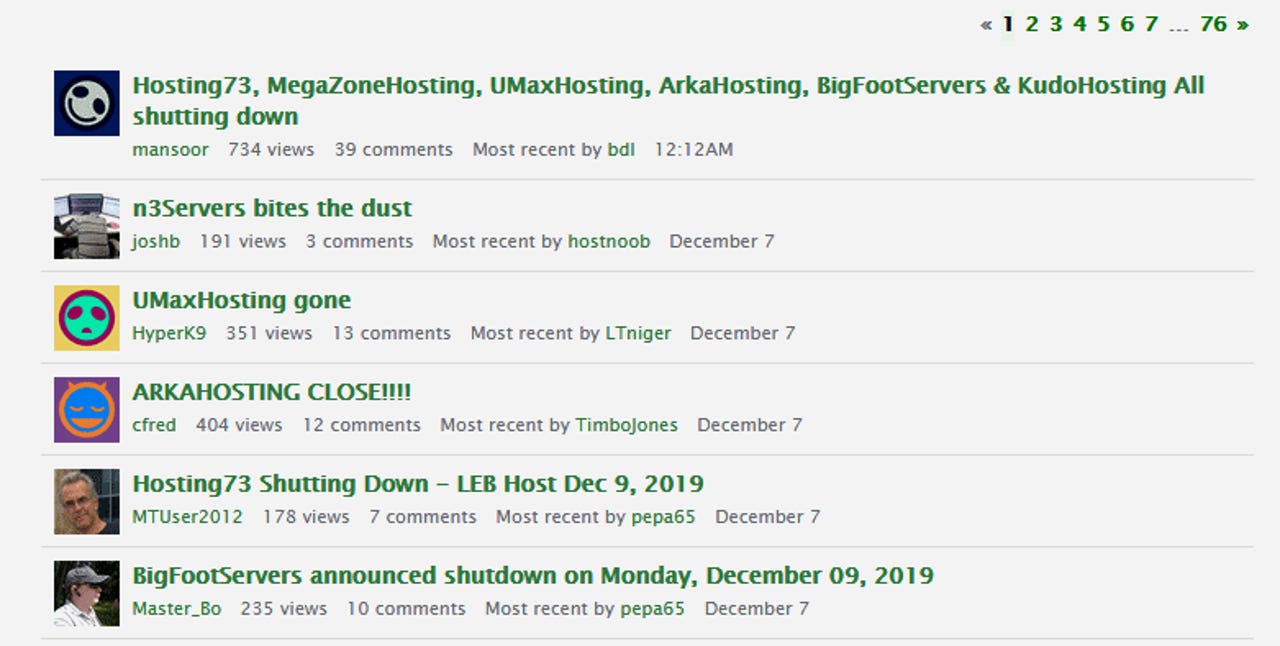20 VPS providers to shut down on Monday, giving customers two days to save their data


At least 20 web hosting providers have hastily notified customers today, Saturday, December 7, that they plan to shut down on Monday, giving their clients two days to download data from their accounts before servers are shut down and wiped clean.
The list of providers that notified customers about their impending shutdown includes:
ArkaHosting
Bigfoot Servers
DCNHost
HostBRZ
HostedSimply
Hosting73
KudoHosting
LQHosting
MegaZoneHosting
n3Servers
ServerStrong
SnowVPS
SparkVPS
StrongHosting
SuperbVPS
SupremeVPS
TCNHosting
UMaxHosting
WelcomeHosting
X4Servers
All the services listed above offer cheap low-end virtual private servers (VPSes).
Furthermore, all the websites feature a similar page structure, share large chunks of text, use the same CAPTCHA technology, and have notified customers using the same email template.
All clues point to the fact that all 20 websites are part of an affiliate scheme or a multi-brand business ran by the same entity.
Shutdown confirmed by customers
The initial reaction on bulletin boards dedicated to discussing web hosting topics was that someone might be sabotaging the company behind all these VPS providers by sending spoofed emails and hoping that customers jump ship.
This proved to be false. In the hours after they received the notifications, several users confirmed the email's legitimacy by analyzing email headers, confirmed the shutdown with the support staff at their respective VPS provider, and found a copy of the same message in their web hosting dashboards.
Since then, customers have shifted from surprise to anger. Some said inquiries about refunds remained unanswered.
Those who didn't lose too much money quickly realized they were set to work the weekend, as they had to download all their data and find a new provider, in order to avoid a prolonged downtime on Monday, when the 20 providers are set to shut off servers.
"Deadpooling"
Online, the phrase "exit scam" is now being mentioned in several places [1, 2, 3]. Many believe the company behind all these VPS providers is running away with the money it made in Black Friday and Cyber Monday deals, without providing any service.
Paranoia and fear of a scam are high, and for good reasons. As several users have pointed out, the VPS providers don't list physical addresses, don't list proper business registration information, and have no references to their ownership. Effectively, they look like ghost companies.
Requests for comment sent by ZDNet to some of the VPS providers remained unanswered before this article's publication.
A source in the web hosting industry who wanted to remain anonymous told ZDNet that what happened this weekend is often referred to as "deadpooling" -- namely, the practice of setting up a small web hosting company, providing ultra-cheap VPS servers for a few dollars a month, and then shutting down a few months later, without refunding customers.
"This is a systemic issue within the low-end market, we call it deadpooling," the source told us. "It doesn't happen often at this scale, however."
A user who was impacted by his VPS provider's shutdown also told ZDNet that the number of VPS providers going down is most likely higher than 20, as not all customers might have shared the email notification online, with others.
Another source in the web hosting industry also pointed out that a search for an IP address used by one of the soon-to-close VPS providers shows it has also been used by other companies that provide cheap VPS hosting services -- which are also using websites with a similar structure and templates as some of the services shutting down this weekend.
We'll most likely find out the extent of the sudden shutdown from Monday going forward, as customers who didn't see the email in time will find their websites or application backends inaccessible and will come forward online to expose other low-end VPS providers that we don't know about yet.
(h/t Bad Packets)
Article updated on December 8 with the explanation for "deadpooling."